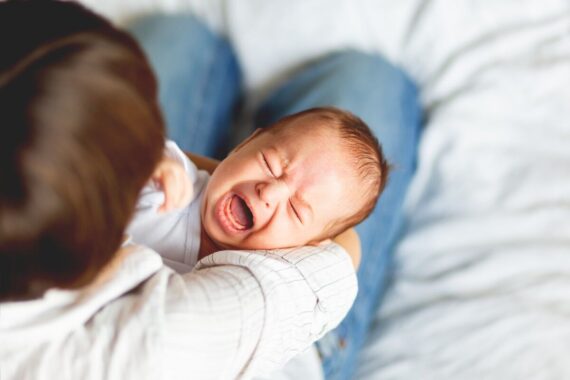New mothers are being ‘failed’ at six-week GP check, claims Healthwatch

New mothers are being failed at their six-week GP check and commissioners should do more to ensure they are being done well, a patient organisation has warned.
Healthwatch England said not all practices are complying with the contractual requirement to provide the postnatal review.
And when checks are done, NICE guidance on best practice is not always followed, particularly around mental health, the organisation said after a patient survey.
Feedback from more than 2,600 new mothers and birthing parents since April 2020 found that 16% had not received the check which should happen at six to eight weeks.
Of those who had a check, 44% said the GP did not spend enough time talking to them about mental health issues and 30% said it was not mentioned.
One in seven who responded to the survey said they had their six-week check over the phone.
Healthwatch said while the survey participants were self-selected they were likely to reflect those of a significant group of those who had recently given birth.
It is not the first time that concerns have been raised about whether the mental health needs of new mothers has been met.
In 2021, a survey by the National Childbirth Trust found a quarter (25%) of new mothers in said they were not asked about their own mental health at their postnatal GP six-week check.
These appointments, which should take place 6-8 weeks after a mother gives birth, have been a longstanding recommendation but became a GP contractual requirement in 2020, with a £12m addition to the global sum.
In response to their findings, Healthwatch called for better consistency in how postnatal checks were done as well as more support for GPs to provide quality mental health care for new mothers.
Their recommendations include:
- ICSs monitoring the delivery of six- week checks as part of primary care commissioning.
- An update the GP contract to make clear that mental health reviews at the six-week postnatal check should be part of an open-ended discussion.
- NHS England considering what additional support and guidance it can provide
for GPs to have quality conversations about mental health during postnatal checks.
Louise Ansari, national director of Healthwatch England said: ‘With mental ill health affecting up to a third of new and expectant mums, six-week postnatal checks are key to assessing their wellbeing after the birth.’
She added: ‘Unfortunately, our findings show that although most new mothers and birthing parents are likely to be invited to a postnatal consultation, these are frequently carried out as a tick-box exercise, where mental health is not treated as a priority or not assessed at all.
‘Monitoring the delivery of six-week checks should be the first step to ensuring there’s a consistent approach to offering quality mental health support to all new mothers.
‘NHS England should consider what additional support and guidance it can provide to GPs so that the help new parents get is of the best quality.’
RCGP chair Professor Kamila Hawthorne said: ‘We are very sorry to hear this as GPs take post-natal care very seriously and are trained to deliver high quality care that takes into account the patient’s individual circumstances.
‘GPs continued to prioritise maternal post-natal checks even during the restrictions of the pandemic. We were well aware that the loss of usual family and wider support networks was making life more difficult for new parents and published specific guidance to support GPs in delivering post-natal and infant care throughout Covid.
‘Adjusting to life with a new baby can be challenging at the best of times and it is incredibly important that new mothers look after their mental and physical wellbeing. General practice is a confidential and non-judgemental space where patients can speak openly and without fear and we want to ensure new mothers receive the care and support they need, as well as signposting to the additional support available from health visitors and midwives.’
However, she Professor Hawthorne stressed that the Government needs to do more to ensure there is sufficient capacity in general practice to support new mothers.
She added: ‘However, the number of GPs is falling at the same time as patient numbers are escalating and we desperately need more GPs so that we can give all our patients the time and care they need and deserve.
‘This is why the College is calling on the Government to rapidly deliver a new recruitment and retention strategy that goes beyond the promise of 6,000 more GPs pledged in its election manifesto. We also need more funding in general practice and steps to cut bureaucracy that takes GPs away from their patients.’
Visit Pulse Reference for details on 140 symptoms, including easily searchable symptoms and categories, offering you a free platform to check symptoms and receive potential diagnoses during consultations.
Related Articles
READERS' COMMENTS [2]
Please note, only GPs are permitted to add comments to articles










There are lots of other things GPs are not managing to do 100% correctly at the moment due to both the ongoing (and set to worsen) Pandemic), and the fact that well over 7% of GP posts are currently vacant, so only partly failing 7% of those surveyed actually seems not bad in the current circumstances.
Hospitals, on the other hand, have more like 70% of their patients on over-long waiting lists, again due to the worsening pandemic and working conditions with massive vacancies.
And GPs are being offered over 3 times the salary for a much easier workload overseas.
For too many, that will be an easy decision. I nearly went to Canada 25 years ago.
PS – did you know Canada was still at war with Denmark 25 years ago?
They settled it last year after huge quantities of alcoholic beverages were consumed by the two sides.